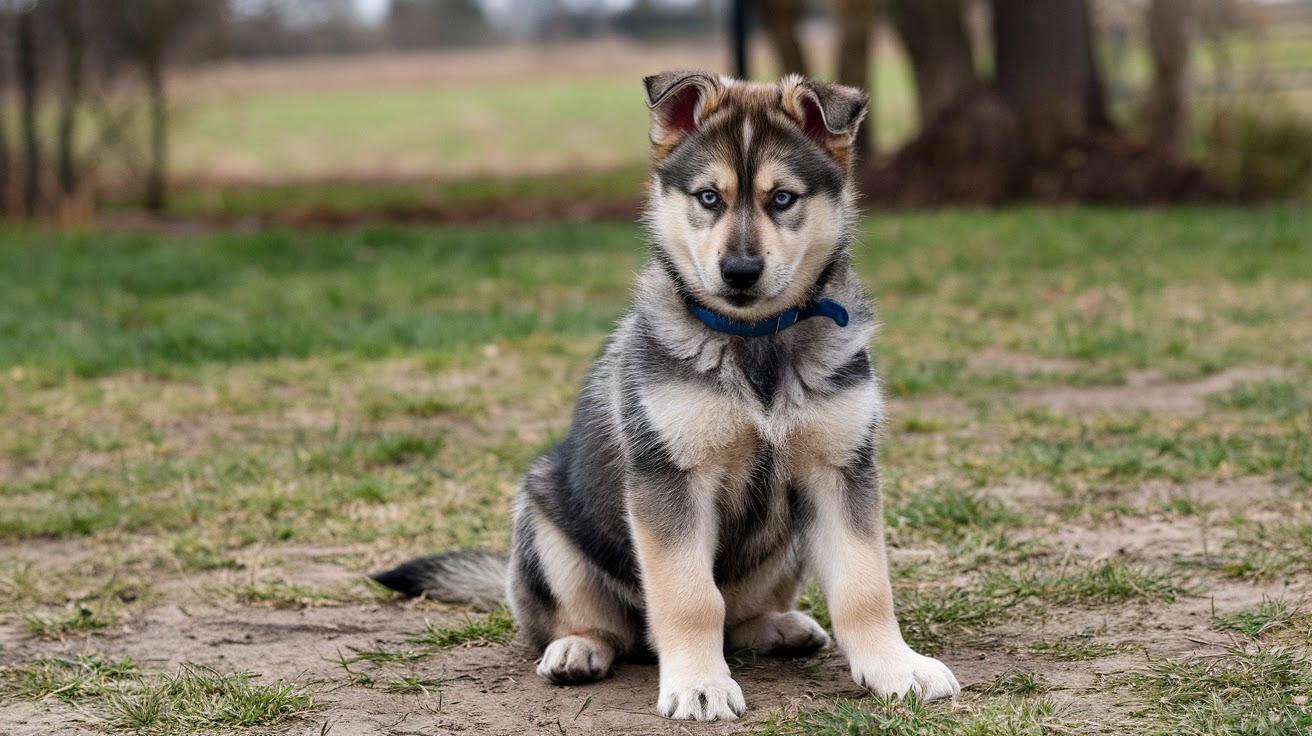The German Shepherd Husky Mix Puppy is also known as the Gerberian Shepsky. It is an energetic hybrid breed which is the result of a cross between a German Shepherd and a Siberian Husky.
These dogs typically inherit the intelligence and loyalty from german shepherds and playfulness and adventurous spirit from Husky. Their appearance is like a wolf and they are popular among dog lovers because of their beauty. They have a thick double coat which makes them well suited for colder climates.
What Is The History Of German Shepherd Husky Mixes?
The German Shepherd originated in Germany in the 19th century by Captain Max von Stephanitz. He aimed to create the perfect working dog which will be known for intelligence, strength, and loyalty.
German Shepherds gained recognition for their trainability And later they started to be used in military and police work worldwide. They are guard dogs and have erect ears and alert expressions.
On the other hand, Chukchi people bred Siberian Husky in Siberia as sled dogs. They were used to pull light loads over long distances in harsh Arctic conditions.
And now if we talk about the German Shepherd Husky Mix, it is a relatively modern hybrid breed. It was created to combine the best traits of both parent breeds.
Their exact origins are not well documented. But it is believed that intentional breeding began in the 1990s in North America. While the Gerberian Shepsky is recognized by designer dog registries like International Designer Canine Registry (IDCR). But not by major kennel clubs because of their hybrid status.
How Big Does A German Shepherd Husky Mix Puppy Get?
An Adult Gerberian Shepskies can have height up to 20 to 25 inches (50 to 63 cm). And weigh between 45 to 90 pounds (20 to 41 kg). When the puppy gets 6 months old it gets up to 50% of their adult size. And full height in 24 months.
Coat Colors and Patterns Of German Shepherd Husky Mix Puppies
- Black and Tan: It looks similar to the traditional German Shepherd coloring.
- Black and White: This color shows the classic Husky pattern.
- Gray and White: This color coat gives a more wolf like appearance.
- Sable: It is a mix of tan with black tipped hairs.
- All Black or All White: These solid colors are less common but possible.
- Agouti and White: It is a wild type coloring seen in some Huskies.
Eye Colors
- Blue
- Brown
- Heterochromia (Each eye is of different color, such as one blue and one brown)
- Parti colored Eyes (Mix of two colors within the same eye, creating a marbled effect)
Temperament And Personality
German Shepherd Husky Mix is a highly intelligent, energetic, and loyal breed. They form strong bonds with their owners and are naturally protective. Because they have a high energy level they love to engage in outdoor activities. They also like “talking” and howling along with alert barking.
When they become bored, they develop behaviors like chewing or digging. They also have problem solving abilities. At last they are great for active families and good with children. But they can chase smaller animals, so in this case proper introductions and training helps.
Activity Requirements Of German Shepherd Husky Mix Puppies
You should give them 1.5 to 2 hours of exercise per day. But puppies may need shorter sessions. Some more activities:
Running: They like to run with their active owners.
Hiking: They like hiking because they love to explore.
Fetch & Frisbee: These games also provide them exercise.
Swimming: Some Shepskies enjoy water activities in hot weather.
Dog Sports: Flyball, dock diving, or herding trials.
Grooming And Maintenance
The German Shepherd Husky Mix coat requires regular grooming to keep it healthy and minimize shedding. You should brush their coat 2-3 times a week. And give them a bath after every 6 to 8 weeks with a hypoallergenic or oatmeal based shampoo. It works best for their skin and coat health.
Clean their ears once a week and trim their nails after every 3 to 4 weeks. Teeth cleaning is also important so brush their teeth 2 to 3 times a week to maintain good dental hygiene.
And if you take them to icy surfaces, for their paw protection you can use dog booties. After it you can also apply paw balm.
Common Health Issues
The Gerberian Shepsky is a hybrid breed which has benefited from hybrid vigor (reducing the likelihood of inherited diseases). But still they can have some:
1. Hip And Elbow Dysplasia
It is a common issue which affects the joints, because of this they can have mobility problems. But you can reduce the risk by giving them regular exercise and maintaining a healthy weight.
2. Degenerative Myelopathy
It is a spinal condition that affects their movement and is seen in older dogs. And there is no cure for it but physical therapy can help a little.
3. Eye Conditions With German Shepherd Husky Mix Puppies
- Cataracts – It causes cloudy vision and may require surgery.
- Progressive Retinal Atrophy (PRA) – This causes vision loss over time.
- Corneal Dystrophy – It affects the cornea.
4. Bloat (Gastric Dilatation-Volvulus)
It is a life threatening condition in which the stomach fills with gas and twists. And this can require surgery to cure. So feed them smaller meals throughout the day and avoid vigorous exercise after eating.
5. Epilepsy
Some Gerberian Shepskies can inherit seizures from their German Shepherd lineage. And it will need medication to cure.
6. Hypothyroidism
It is a condition in which thyroid doesn’t produce enough hormones. And your dog will feel lethargy, weight gain and coat issues. But don’t worry it can be managed with medication and diet.
Lifespan Of German Shepherd Husky Mix Puppies
With proper nutrition, exercise, mental stimulation, and regular vet care they can live for 10 to 14 years.
Diet And Nutrition
A German Shepherd Husky Mix (Gerberian Shepsky) requires a well balanced diet. With high protein to support muscle development and their growth. Try to give them proper nutrition from puppyhood to adulthood to prevent health issues.
So there should be 22 to 26% protein in their diet, which can be taken from chicken, beef, lamb, fish, or turkey. And healthy fats, about 8 to 12% , will support skin and coat health. Moreover calcium & phosphorus is also important for strong bones and joints. But don’t give too much otherwise they may get joint issues.
And for their brain development Omega-3 Fatty Acids can help. There are two types of dog foods normally:
1. Dry Kibble
This can provide dental benefits. You should look for brands with real meat as the first ingredient and no artificial fillers. Can use these brands Orijen, Blue Buffalo Wilderness, Taste of the Wild and Wellness Core.
2. Wet Food
This can help your dog with hydration but balance with kibble for dental health. You can use Merrick, Canidae or Nutro.
Feeding Schedule For Your German Shepherd Husky Mix Puppies
| Age | Meals per Day |
| Less Than 8 weeks | Mothers Milk |
| 8 to 12 Weeks | 4 meals |
| 4 to 6 Months | 3 meals |
| 7 to 11 Months | 2 to 3 meals |
| 1 to 7 Years (Adult) | 2 meals |
| 7+ Years (Senior) | 2 meals |
Training
This mix is an intelligent dog. You can start their training when they get 8 weeks old, But start with basic commands such as:
✅ Sit
✅ Stay – It is for safety and discipline.
✅ Come – It can be used for recall training.
✅ Heel – It prevents pulling on the leash.
✅ Leave it – It stops them from picking up unwanted objects.
And when they get 4 months old, then you can take them towards more advanced training like impulse control or off leash.
What Are The Pros And Cons Of The Shepsky?
| Pros ✅ | Cons ❌ |
| 🧠 Quick learners. | Stubborn 😤. |
| 🛡️ They make strong bonds with owners | They need High Activity 🏃 |
| 🎾 They love outdoor activities. | Heavy Shedding & Grooming Needs 🧹 – Thick double coat sheds. |
| Beautiful Appearance 🐺 | Strong Prey Drive 🦊 |
| ❄️ Thick coat protects them in cold weather. | Can Develop Separation Anxiety 😢 – They don’t do well if left alone for long periods. |
Is The Shepsky Right for You?
The answer is yes ✅ if you:
- Have an active lifestyle and can provide plenty of exercise.
- Have experience with large, intelligent breeds.
- Have an open space for them to run.
Price
| Category | Price Range ($USD) |
| Breeder Price | $500 to $1,500+ |
| Adoption Fee | $50 to $300 |
| Yearly Expenses | $1,000 to $2,500 |
| Medical Emergencies | $500 to $3,000+ |



